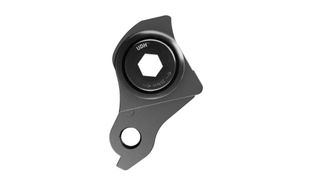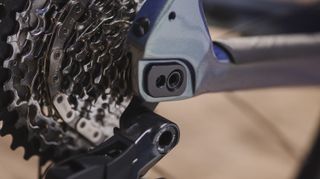For those who’ve ever needed to change a bent or damaged rear derailleur hanger, you’ll understand how onerous it’s to discover a spare. Each bike appears to have a novel design.
However there could also be an answer to this downside within the type of SRAM’s UDH rear hanger. It additionally opens up an attention-grabbing view on the place SRAM sees its derailleur tech heading, within the type of its Transmission derailleur as seen within the unreleased 1×13-speed SRAM Purple AXS XPLR groupset that we noticed at Unbound. Extra on this later.
Why UDH?
UDH stands for Common Derailleur Hanger and it’s SRAM’s know-how that goals to supply a single hanger design that producers can undertake for his or her bikes, with benefits over the everyday mech hangers, which bolt onto the bike’s body under the rear axle.
UDH has some crashproofing inbuilt, because the hanger can shift backwards barely on influence. This isn’t the case for many derailleur hanger designs, which have a inflexible connection to the bike’s dropout. It’s additionally designed to rerail a series if it falls off the surface of the smallest sprocket.
A motorcycle does must be designed to simply accept UDH, so it nonetheless will not match the vast majority of present street and gravel bike body designs. In case your bike is not UDH suitable, you may nonetheless have that hunt for a substitute hanger.
Not only for MTBs

UDH appears to simplify discovering a substitute derailleur hanger
(Picture credit score: SRAM)
UDH was initially devised for mountain bikes, however its adoption is now spreading to street and gravel bikes too.
The newest Gen 8 Trek Madone, for instance, has switched from a Trek own-design derailleur hanger to make use of the UDH commonplace.
The newest race content material, interviews, options, critiques and professional shopping for guides, direct to your inbox!
Trek’s director of street bikes, Jordan Roessingh, explains why: “One of many ideas that we’ve been pursuing throughout all Trek street bikes is absolutely standardizing issues that may be shared parts throughout extra of our platforms within the Trek street household.
“That began with the T47 backside bracket system that’s throughout all of the Trek street platforms now. For the brand new Gen 8 Madone, that’s prolonged to the UDH and the Common Headset System.”
Trek isn’t the one model to have used UDH for its street or gravel bikes. The Canyon Grail and bikes from Lauf, Cervélo, 3T, Ridley and others are designed to make use of a UDH derailleur hanger. Adoption for drop bar bikes is centered on gravel, however as Trek’s determination to make use of UDH on the Gen 8 Madone signifies, it’s shifting to the street too.
Why are bike producers specializing in UDH?
“For us that was actually an intuitive determination to say these elements don’t should be differentiated for the efficiency of the product, however the rider and the sellers are going to profit from having the ability to discover these elements a lot simpler and making them interchangeable between completely different Trek street platforms,” says Roessingh.
It does appear that bike and part makers are lastly starting to deal with the proliferation of incompatible elements and its impact on each substitute availability and on the inventory {that a} typical bike store must preserve.
Different rationalisation initiatives embody Shimano CUES, which will increase consistency between Shimano’s 9, 10 and 11-speed groupsets. Bike makers are additionally focusing extra on T47 or BSA backside bracket requirements, reasonably than the Tower of Backside Bracket Babel of some years in the past.
Compatibility conundrum

Direct Mount removes the quick B-Hyperlink, seen right here, between the derailleur and the mech hanger
(Picture credit score: Shimano)
Not all manufacturers are on-board with UDH although. One subject is compatibility with the Shimano Direct Mount derailleur hanger commonplace. Direct Mount removes one of many linkages, known as the B-Hyperlink, which sits between the derailleur itself and a traditional derailleur hanger, by positioning the derailleur-to-hanger connection additional rearward and decrease than with a typical hanger.
By taking out the B-Hyperlink, Shimano claims that Direct Mount ensures extra exact derailleur alignment – one of many points that UDH can also be designed to deal with. Direct Mount can also be utilized by Campagnolo.
So though you should use UDH with Shimano and Campagnolo derailleurs, until you purchase a UDH Direct Mount hanger (Wheels Manufacturing sells one), you’ll want to incorporate the B-Hyperlink to make use of a Shimano Shadow-style derailleur on a UDH bike body.
UDH does have some quirks as effectively, at the least for the house mechanic. SRAM specifies tightening the derailleur to 20Nm. The bolt is reverse threaded although, and never all torque wrenches can work in an anticlockwise path in addition to clockwise. So that you would possibly want a motorbike store with the proper instruments to suit a brand new UDH hanger for you in order that its rearward motion functionality works appropriately.

UDH compatibility with a rear axle flip chip is not simple to realize
(Picture credit score: Big)
UDH would not have simple compatibility with Flip Chip rear axles both, equivalent to that on the new Big Revolt.
UDH can also be primarily geared toward compatibility with carbon fiber bike frames with 12mm diameter thru-axles. Makers of steel frames report extra problem producing an interface to the dropout that doesn’t look unpleasant or over-heavy.
The top of the bent mech hanger?

T-Kind derailleurs connect to each side of a UDH-compatible dropout
(Picture credit score: Anne-Marije Rook)
The standardisation of the derailleur-to-frame interface with UDH opens up one other innovation that SRAM has already utilized to its mountain bikes and that appears set to seek out its method to the street and to gravel.
Transmission (or T-Kind) MTB rear derailleurs dispense with the mech hanger fully, with the derailleur attaching on to each side of the rear dropout. This does require the identical dropout spacing and form as UDH.
Among the many benefits cited by SRAM are the exact alignment of the derailleur and the cassette, making restrict screws and B-link adjustment issues of the previous. The connection can also be very sturdy. SRAM has movies of its employees standing on the derailleur and it nonetheless shifts afterwards.
Transmission derailleurs look to be coming to drop bar bikes too, at the least to 1x gravel bikes. On the 2024 Unbound gravel race, we noticed an unreleased 13-speed SRAM Purple AXS XPLR rear derailleur, serving to to elucidate the absence of a 1x set-up when SRAM introduced its replace of 2×12-speed Purple AXS.
If Purple AXS XPLR 13-speed is to be launched to the general public, we are able to anticipate it to hold top-end pricing; though, SRAM has a historical past of trickling its newest tech down fairly quickly to its lower-tier groupsets.
Will we see a 2×13-speed T-Kind SRAM Purple AXS? It’s not implausible sooner or later, though it’s going to most likely await the adoption of UDH on a higher variety of street bikes and be offered alongside a derailleur with a typical body connection, in order that riders and not using a UDH frameset are catered for.
SRAM’s top-tier MTB groupsets now use the T-Kind body interface. If SRAM follows the identical migration pathway for street and gravel, riders selecting bikes with non-UDH frames might in future discover themselves locked out of the model’s flagship derailleur programs.
We’re additionally prone to see one other crop of 1x street bikes on sale, because the ever-growing variety of sprockets reduces the jumps between ratios which had been a turn-off with 11 and 12-speed 1x groupsets for street use.

